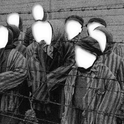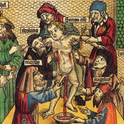“Pogrom” is one of few Russian words that have found their way into English dictionaries. Mass murders of Jews, accompanied by robbing their property—pogroms—were regular events in the Russian Empire. Its Jewish population, the largest in the world, was forbidden to move beyond the Pale of Settlement. Crowded, landless and unarmed, these Jews were easy targets of ethnic hatred.
Things changed in the Soviet period. The first revolution of 1917 abolished the Pale, the second enabled Jews to enter the cultural and economic elite of the country. The Moscow authorities entertained ethnic purges for various reasons—not just of Jews but of Soviet Poles, Germans or Chechens too. New generations of highly educated Jews settled all over the Soviet Union as doctors, engineers, military officers or party officials. Things changed again in the last decades of the 20th century when massive emigration to Israel depleted the population of Soviet Jews. Still, some of them—maybe 100,000, maybe half a million out of a once five million-strong population—stayed in the country. Post-Soviet transformation enriched some of these people and impoverished others. An outsider may be surprised to learn how many well-known figures—say, Anatoly Chubais or Roman Abramovich—would be counted as Jews.
This central-Russian story, however, could also be applied to Dagestan, only with a caveat. The Jews of the Caucasus, the so-called Mountain Jews or Tats, are a unique group, which makes them an exception from easy truths. Having come from Persia in the early Middle Ages, they were very different from the Ashkenazi Jews who arrived from western Europe much later. Ancient Tats were warriors and farmers. In the imperial period, they were allowed to own land, and they farmed it along with the native population. Later, many of them migrated to Israel, but there are still an estimated 10,000 to 15,000 of them in Dagestan. Their life in this multi-ethnic land was relatively peaceful. Scholars who study these communities do not believe that there is any tradition of antisemitism in Dagestan.
Bordering modern Azerbaijan, Georgia and the Caspian Sea, Dagestan is a densely populated land with a predominantly Muslim population. Its fertility rate is higher than in the rest of Russia, and the unemployment rate is also high. The population is relatively young, incomes are low even by Russian standards, and educational institutions are miserable. Like other ethnic “republics” of the Russian Federation, Dagestan has been kept very far from republican values. However, since the start of the Russo-Ukrainian War and the so-called “partial” mobilisation, Dagestan has undergone a rapid politicisation. Since the first protests in May 2022, Dagestani young men have demonstrated against the mass conscription that has targeted them disproportionally to the Muscovites. As is typical in colonial situations, conspiracy theories and myths proliferate in this milieu. These stories partially come from Russian-language TV and social media (including Telegram channels), and partially—among the better educated—are connected to the ideas of radical Islam. Such anti-elite, anti-Moscow, and antisemitic sentiments have been merging into one diffuse anger, waiting for a trigger.
Last week, the news from the war in Gaza acted as this trigger, and a crowd of young Dagestani stormed the region’s main airport, looking for Jews. Waving Palestinian flags, the crowd chanted antisemitic slogans, harassed everyone who they thought did not look local—a doctor, an Uzbek—and searched for passengers who could have, they suspected, arrived on a flight from Tel Aviv. Many of the mob have had never met a Jewish person in their life. Controlled by the local authorities, the security of the airport did nothing to stop the crowd—its slogans probably sounded fine to these armed local men.
The Moscow authorities have been visibly scared but, uncharacteristically, chose soft means of reprimanding the leaders of the mob. Talking to his Security Council, Putin blamed imagined Ukrainian spies for influencing the crowd and organising the riot, in which Russia’s health ministry has said 20 people were injured, two critically. Mirroring Putin, the Russian opposition tends to believe that the crowd was organised by the Kremlin. Neither of these positions holds water. The crowd and its passions were genuine: contrary to the deepest beliefs of Russian “political technologists”, common people do have their feelings and they turn them into actions.
After the Prigozhin coup in June, the Dagestani riot was the next major event to demonstrate how the Kremlin is losing its control of the provinces. The violently antisemitic character of the riot was evident; what has been lost in the story is that the Dagestani airport mob was expressing anti-elite, anti-Moscow, decentralising sentiments. Only the Kremlin grasped this message, and this is why it looks more scared than usual. The mob merged its anti-Moscow feelings with Islamic slogans and antisemitic acts and symbols. As the two recent wars in neighbouring Chechnya have told us, decolonisation of the Caucasus is a long and bloody process. Russia’s Jews are in danger, and so are a much broader group of people who, having no better word, identify themselves with “the elite”; no wonder that these people, and their assets, are fleeing from Moscow. Russia’s disintegration will be messy, but no comparison to Putin’s war in Ukraine, which has triggered the forthcoming collapse of his “federation”.













